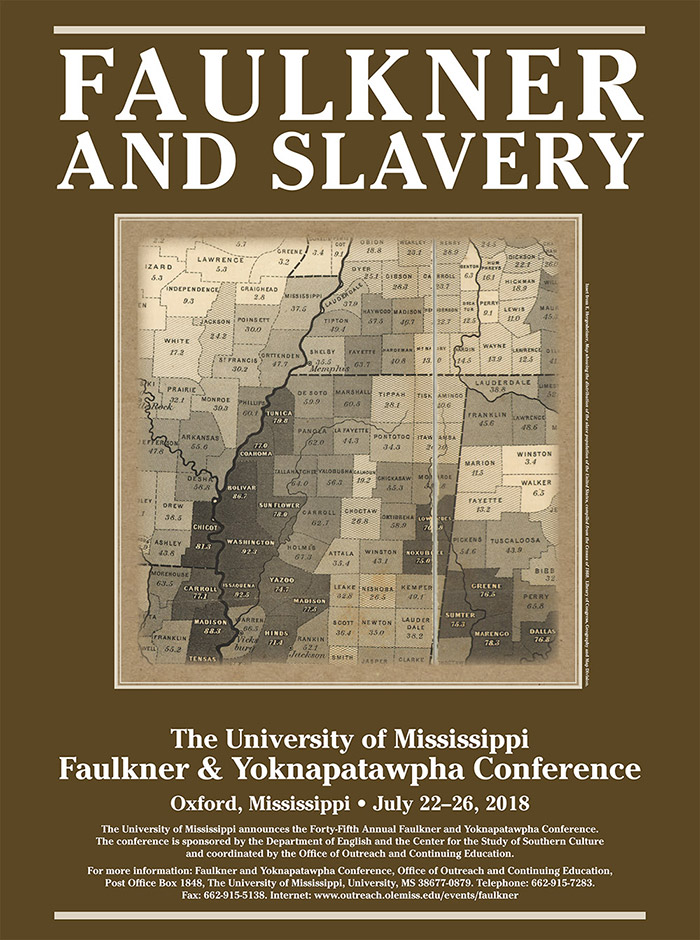
Panel. Current Research on Slavery at the University of Mississippi
Location
Nutt Auditorium
Start Date
23-7-2018 3:30 PM
Description
- The March Toward Militancy: Student Aggression and the Slave Community at the University of Mississippi / Chet Bush, University of Mississippi
The first thirteen years of the University of Mississippi offer a window through which to observe the activities that characterized the all-male student culture. While community storytellers have imagined a single meeting where students hatched a plan to form a military company in support of the Confederacy, the archives of the university suggest a much longer gestation of violence and militancy. From the founding of the university in 1848 to the start of the war in 1861 students demonstrated an increasingly obsessive preoccupation with asserting authority. Student concern for displaying power grew particularly hostile toward the slave community in the years leading up to the Civil War. This paper charts the march toward militancy that students expressed, chiefly toward enslaved workers, during the first thirteen years of the University of Mississippi. - Proslavery and States’ Rights Incubators: Fraternal Debate Societies at the University of Mississippi, 1848-1861 / Andrew Marion, University of Mississippi
This presentation will examine how two fraternal debate societies at the University of Mississippi worked as incubators for proslavery and states' rights ideology for the students from 1848 to 1861. Mandatory participation in these societies put students in academic environments that promoted unwavering loyalty to the state of Mississippi and its most sacred institution, slavery. An examination of proslavery rhetoric delivered at the university and debate society meeting minutes and publications will help explain the incredible commitment that the University of Mississippi's students made to defend slavery and the Confederacy. - The World the Slaves Made: Slaveholding, Student Wealth, and the Foundations of the University of Mississippi / Anne Twitty
When fifteen-year-old John Sanders McRaven of Marshall County matriculated at the University of Mississippi in 1849, his father, planter Robert McRaven, was no doubt the animating force. If Robert was the architect of John’s education, however, the sixty-one men, women, and children Robert claimed in the 1850 census were its underwriters. Although scholars have identified many enslaved people who lived on college campuses and examined the centrality of their work at such facilities, little attention has been paid to the enslaved people laboring tens or hundreds of miles from these institutions who nevertheless helped create, facilitate, and maintain them. To address this omission, this paper traces the slaveholdings of the University of Mississippi’s first students through the 1850 census to explore how enslaved black people far removed from the University of Mississippi made possible the scholarly endeavors of free white men at its campus in Oxford.
Relational Format
Conference proceeding
Recommended Citation
Bush, Chet; Marion, Andrew; and Twitty, Anne, "Panel. Current Research on Slavery at the University of Mississippi" (2018). Faulkner and Yoknapatawpha Conference. 12.
https://egrove.olemiss.edu/fy/2018/schedule/12
COinS
Jul 23rd, 3:30 PM
Panel. Current Research on Slavery at the University of Mississippi
Nutt Auditorium
- The March Toward Militancy: Student Aggression and the Slave Community at the University of Mississippi / Chet Bush, University of Mississippi
The first thirteen years of the University of Mississippi offer a window through which to observe the activities that characterized the all-male student culture. While community storytellers have imagined a single meeting where students hatched a plan to form a military company in support of the Confederacy, the archives of the university suggest a much longer gestation of violence and militancy. From the founding of the university in 1848 to the start of the war in 1861 students demonstrated an increasingly obsessive preoccupation with asserting authority. Student concern for displaying power grew particularly hostile toward the slave community in the years leading up to the Civil War. This paper charts the march toward militancy that students expressed, chiefly toward enslaved workers, during the first thirteen years of the University of Mississippi. - Proslavery and States’ Rights Incubators: Fraternal Debate Societies at the University of Mississippi, 1848-1861 / Andrew Marion, University of Mississippi
This presentation will examine how two fraternal debate societies at the University of Mississippi worked as incubators for proslavery and states' rights ideology for the students from 1848 to 1861. Mandatory participation in these societies put students in academic environments that promoted unwavering loyalty to the state of Mississippi and its most sacred institution, slavery. An examination of proslavery rhetoric delivered at the university and debate society meeting minutes and publications will help explain the incredible commitment that the University of Mississippi's students made to defend slavery and the Confederacy. - The World the Slaves Made: Slaveholding, Student Wealth, and the Foundations of the University of Mississippi / Anne Twitty
When fifteen-year-old John Sanders McRaven of Marshall County matriculated at the University of Mississippi in 1849, his father, planter Robert McRaven, was no doubt the animating force. If Robert was the architect of John’s education, however, the sixty-one men, women, and children Robert claimed in the 1850 census were its underwriters. Although scholars have identified many enslaved people who lived on college campuses and examined the centrality of their work at such facilities, little attention has been paid to the enslaved people laboring tens or hundreds of miles from these institutions who nevertheless helped create, facilitate, and maintain them. To address this omission, this paper traces the slaveholdings of the University of Mississippi’s first students through the 1850 census to explore how enslaved black people far removed from the University of Mississippi made possible the scholarly endeavors of free white men at its campus in Oxford.

